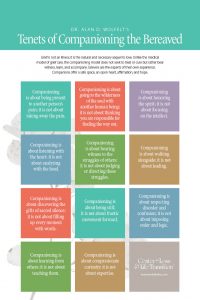Companioning is about honoring the spirit; it is not about focusing on the intellect.
by Alan D. Wolfelt, Ph.D.
“The ultimate cure, as many ancient and modern psychologies of depth have asserted, comes from love and not from logic.” Thomas Moore
To be torn apart and to then become whole again we need more than our intellect. We need the experiences that spring from the spirit and the soul. “Spirit” can be broadly defined as our nonphysical essences, which include dimensions of intellect, emotion, personality and spirituality. I often perceive the spirit as the “life-force.” As human beings we are spirit explorers who have stepped into bodies here on earth.
“Soul” in not a thing but a quality or dimension of experiencing life. Thomas Moore notes that soul “has to do with depth, value, relatedness, heart and personal substance.” If you wish to companion people in grief, I believe you must be present to matters of the spirit and soul.
Obviously, we as humans seek protection from raw emotions by, at times, intellectualizing the experiences of grief. We move back and forth between head and heart, between intellect and feeling. I submit that in contemporary North America we are often invited to think around losses instead of feel them through. We bring to grief a fix-it attitude, assuming that the experience is something to be overcome and that you would be well served to “let go” of it and move on quickly and efficiently.
instead of feel them through. We bring to grief a fix-it attitude, assuming that the experience is something to be overcome and that you would be well served to “let go” of it and move on quickly and efficiently.
Yet, matters of the spirit and soul are not dedicated to letting go and moving on in some perfectionist, intellectual fashion. If we want to give attention to the spirit and the soul, then we have to discard the our wish for resolution and give care in ways that respect the energy of grief. As John Donne, the poet of relationship and soul, once observed, “He who has no time to mourn, has no time to mend.“ Respect for grief demands our appreciation for its complexity.
Accepting What Is
When we look at the spirit and soul of grief, we discover value in slowing down and not trying to take away painful emotions that are a necessary part of the journey. If we join the griever in only trying to think through loss, we are trying to avoid the reaches of the spirit and the soul. When you as a caregiver give attention to the messages from the spirit and soul, you empathize with the uncomfortable thoughts and feelings that are inherent to the journey.
Working within this premise encourages you to support the grieving person in taking back what she is often trying to intellectually disown, such as depression, anxiety and loss of control. As opposed to wishing they weren’t there, you work with the raw emotions by entering into them. Instead of trying to manage the grief the person is experiencing, you realize the value of the grief managing the person. As the Greek philosopher Heraclitus observed many years ago, “The soul has its own source of unfolding.”
A homeopathic response to grief is to go with what is presented rather than against it. We befriend grief instead of making an enemy of it. Instead of trying to quickly get away from our grief, we savor it.
If the griever is experiencing deep sadness, then the spirit and soul are expressing the rhythms of the journey into and through grief. Instead of trying to outmaneuver these forces and use some premature technique to return life to “normal” (an inappropriate helping goal), I submit that the more authentic way of being in tune with the soul is in the direction of the symptoms. Any other response is like fighting with what the spirit and soul are bringing forth.
Have you noticed how depression has gotten a bad name these days? It’s like we expect we have some God-given right to never be depressed. Yet, in my experience, normal life circumstances, such as the death of someone precious to us, can naturally result in depression, particularly, if defined in the following way:
Depression: A turning inward when the world outside no longer seems to be charged with meaning and purpose.
Respecting the Work of the Soul
I find that as a companion who tries to be respectful of soul and spirit work, my role is to empathize with what is being expressed in the  moment. For example, if a person comes into my Center for Loss and says, “I can’t get my feet out of bed in the morning,” my responsibility is not to use some technique to help this person overcome the lethargy of grief accompanied by profound sadness. Instead, my role is to empathize with what it is like to be a lost spirit and soul. I try to help the mourner embrace her soul work: “Someone precious has died. I feel so alone right now. My body, spirit and soul are depressed. I lack meaning and purpose in my daily life right now. What am I trying to experience so that slowly, over time, I can discover renewed meaning in my life?” This is the kind of empathetic responsiveness that helps create a non-judgmental companioning relationship with this person.
moment. For example, if a person comes into my Center for Loss and says, “I can’t get my feet out of bed in the morning,” my responsibility is not to use some technique to help this person overcome the lethargy of grief accompanied by profound sadness. Instead, my role is to empathize with what it is like to be a lost spirit and soul. I try to help the mourner embrace her soul work: “Someone precious has died. I feel so alone right now. My body, spirit and soul are depressed. I lack meaning and purpose in my daily life right now. What am I trying to experience so that slowly, over time, I can discover renewed meaning in my life?” This is the kind of empathetic responsiveness that helps create a non-judgmental companioning relationship with this person.
Being respectful might lead me to simply respond in ways that encourage her to be self-compassionate about the normalcy of the physical and emotional symptoms of her grief. I might restate for her, “So, right now, it’s hard to get your feet out of bed.” My response to people in grief is based on the belief that the only way beyond the experience of grief is through the experience of grief. The mourner must descend before she can transcend. Many contemporary “therapies” get this descend–transcend experience out of order.
Yes, when the spirit and soul of grief come to life in grief, the ordinary wisdom or intellectual life loses much of its power. To avoid our own pain, we may be tempted to offer up some rational advice like, “Being depressed isn’t going to bring the person who died back.” Yet, these kind of rationalizations are not helpful in the end. Repression of the voices of the spirit and soul only serve to move the griever further away from the ultimate integration of the death into her life. Even depression has the capacity to propel the mourner to insights that can result in eventual renewal.
Honoring the spirit and soul is about being honest about the sting of grief and acknowledging the reality of the depth of the loss. Some native cultures describe “speaking with spirit tongue” when they emphasize the importance of being honest and telling the truth. Honoring the spirit and soul is what I refer to as “listening with the spirit ear,” wherein you witness the honest pain of the loss and affirm the need of the mourner to tell the truth about the transformational journey of grief.
In reflecting on the vital importance of honoring the spirit and soul of grief, I think about the shamanic concept of sacred hoops, which is synonymous with the term “authenticity” or being connected to your own spirituality. The idea is that when you experience being yourself, you are in your sacred hoop, and when you are being genuinely who you are without pretense, you are sitting inside your sacred hoop. Being truly who you are when companioning people in grief allows you to honor the spirit—the life force—of another human being.
A soul- and spirit-centered understanding of grief mandates a different language from that of traditional mental health care. We companion our fellow strugglers by honoring their expressions of grief, recognizing that spirit and soul have their own purposes, and supporting them more from our hearts than from our heads.
This article is excerpted from Dr. Alan Wolfelt’s book Companioning the Bereaved: A Soulful Guide for Caregivers, available at bookstores and at Dr. Wolfelt’s website, www.centerforloss.com. Dr. Wolfelt is an internationally noted author, teacher and grief counselor. He serves as Director of the Center for Loss and Life Transition and is an educational consultant to funeral homes, hospices, hospitals, schools and a variety of community agencies across North America.
TenetsofCompanioning_24x36To download this poster, click here: TenetsofCompanioning_24x36
CLICK HERE TO JOIN AFTERTALK
Free, Non-Profit and Non-denominational
Every Wednesday we will be publishing Pandemic Weekly for, we hope, not too long. We invite you to submit your thoughts, essays, poems or songs. Please send to info@aftertalk.com. To see past Pandemic Weeklies, CLICK HERE

